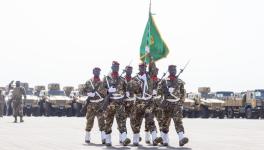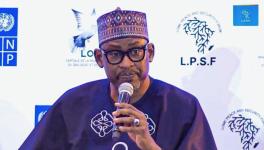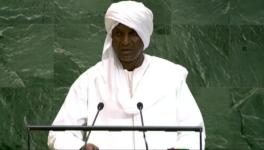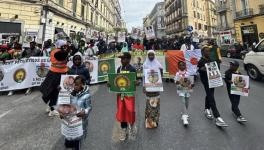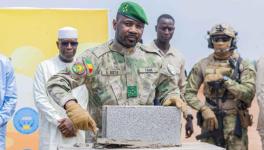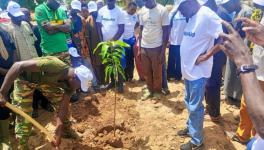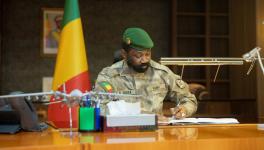Sankara’s Revolution Rises Again
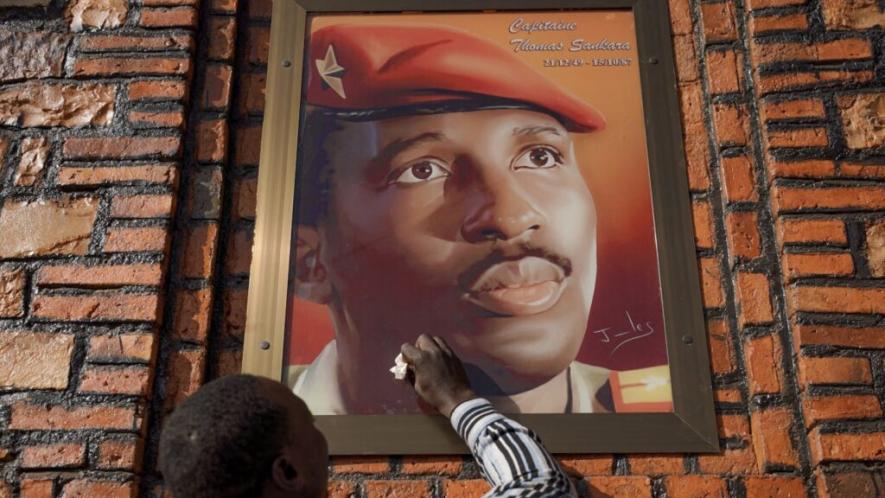
Portrait of assassinated Burkinabé President Thomas Sankara in Niamey, Niger. Photo: Pedro Stropasolas
Today, August 4, marks 42 years since Thomas Sankara came to power in Burkina Faso, revitalizing the spirit of national liberation across Africa. His assassination in October 1987, though a setback, could not extinguish the struggle for Africa’s emancipation, for which he lived and ultimately died.
His critique of foreign debt as “a skillfully managed reconquest of Africa,” delivered at the Organization of African Unity (OAU) Summit three months before his murder, still resonates today. Nearly four decades after these initial steps, in the southern Sahel, Mali, Niger, and Burkina Faso have established the Alliance of Sahel States (AES). By uniting 71.4 million people across 2.78 million km², the AES becomes the first bloc in decades to challenge the deeply rooted imperialist frameworks of Françafrique and Bretton Woods institutions.
Echoing Sankara’s famous saying, “he who feeds you, controls you,” the new government in Ouagadougou is implementing policies aimed at economic self-sufficiency. Under Captain Ibrahim Traoré, the state has nationalized key gold mines – a direct challenge to foreign corporate control over the country’s most valuable resource.
To enhance food security for the agricultural workers, who make up the majority of Burkina Faso’s population, his administration has begun distributing vital farming equipment, including 400 tractors and hundreds of motorized pumps, to rural cooperatives. Additionally, by carefully managing loans from the International Monetary Fund and World Bank, Traoré’s government shows its intention to avoid what Sankara himself called the “debt trap,” which he regarded as a primary way of undermining African sovereignty. While the long-term success of the AES remains debated, its symbolism and direction indicate a clear move away from the colonial and neocolonial past.
The economic ambitions of the AES go beyond symbolism. The founders are committed to establishing a common market, unifying passports, and creating an Alliance of Sahel States Investment Bank. These objectives include discussions about introducing a regional currency to replace the CFA franc, a move that would significantly challenge French neocolonialism by reclaiming monetary policy.
The AES’s efforts are aimed at reversing the billions of Euros that have been drained from former French colonies since independence. These efforts also seek to bridge the significant annual growth gap between the CFA zone and non-CFA economies, demonstrating the alliance’s commitment to economic justice.
Security cooperation has buttressed these economic initiatives. A joint force of troops patrols the Liptako-Gourma tri-border area, aiming to contain jihadist insurgencies that have devastated entire communities. By expelling all French troops from their territories by December 2023, each capital publicly challenges French imperialist dominance, which, since 1960, has involved France intervening militarily in African states about once a year.
The AES remains a fragile infant with an uncertain future. Its bank must secure African sovereign-wealth funds, diaspora investments, and BRICS+ partnerships. It must also withstand sanctions and covert sabotage from neocolonial actors, whose dominance is challenged by the bloc’s debt repudiation, resource nationalism, and insistence on territorial sovereignty.
How, then, can the potential of the AES be realized? The accumulated experience of national liberation struggles shows that there is no sustained fight for dignity without putting the people at the centre. As both the driving force in the struggle for freedom and the ultimate beneficiaries of sovereign, patriotic revolutions, like those ignited in the Sahel, the people must continue to be prominently featured as the spear and shield of these emerging revolutionary processes.
The only meaningful safeguard against enduring setbacks in this revolutionary process is a didactic dialogue between the popular forces and these new AES governments, who bear the hopes not only of their own people but of the entire continent. Through the challenges and opportunities that lie ahead, this dialogue serves as the crucial link that must ensure the governments and the popular forces jointly build the future of the AES.
To honour Sankara today, we must go beyond images on T-shirts and murals on Ouagadougou’s walls: we must build the institutions he envisioned, from banks to broom brigades and more.
If the AES can, by maintaining and capitalizing on the current wave of popular support, realize genuine sovereignty – through shared currency, regional citizenship, and industrialized agriculture – it will not only affirm Sankara’s assertion that Africa’s dignity cannot be handed over to “technical assassins,” but also lay the foundation for a brighter, more independent future for Africa.
It will show that the revolution he began over four decades ago did not die with Blaise Compaoré’s betrayal. His revolution still lives and inspires the people’s forces from Ouagadougou to Nairobi. It has become quite clear that there is no complacency amid a stagnant struggle for genuine freedom across all parts of the African continent.
In six weeks, on September 16, 2025, the world will observe two years since the official formation of the AES. This historic event marked a shift towards patriotism and a renewed commitment to sovereignty across Africa. Whether this moment signals a sustained move towards broader African unity, dignity, and freedom remains uncertain. The significance of the formation of the AES, much like the importance of Thomas Sankara’s revolution nearly half a century ago, relies on those of us who are invested in what it represents.
The ultimate success of the AES will therefore depend not only on its leaders but also on the ability of its supporters – both within the Sahel and internationally – to build a broad coalition, united against imperialism. It is through their acts of concrete solidarity, education, and awareness-raising in the coming months that imperialist narratives can be challenged.
By standing shoulder to shoulder with the peoples of Africa and the organizations they have built, a powerful, unified call can be raised to the Burkinabé revolutionary, Thomas Sankara: “Your revolution lives – and in the Sahel, in Africa, and across the world, it is rising again!”
Jonis Ghedi-Alasow is the Coordinator of the Pan Africanism Today Secretariat.
Courtesy: Peoples Dispatch
Get the latest reports & analysis with people's perspective on Protests, movements & deep analytical videos, discussions of the current affairs in your Telegram app. Subscribe to NewsClick's Telegram channel & get Real-Time updates on stories, as they get published on our website.










